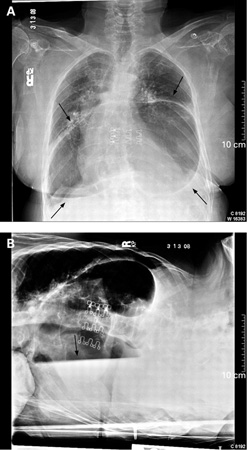Resumo
Definition
ანამნეზი და გასინჯვა
ძირითადი დიაგნოსტიკური ფაქტორები
- bowel sounds in chest
სხვა დიაგნოსტიკური ფაქტორები
- heartburn
- regurgitation
- obesity
- chest pain
- dysphagia
- odynophagia
- hematemesis
- shortness of breath
- cough
- oropharyngitis
- wheezing
- nonbilious vomiting
- fever and chills
- confusion
რისკფაქტორები
- obesity
- increased age
- previous gastroesophageal procedure
- elevated intra-abdominal pressure
- male sex
- incisional, umbilical, or inguinal hernia
დიაგნოსტიკური კვლევები
1-ად შესაკვეთი გამოკვლევები
- chest x-ray
- upper gastrointestinal fluoroscopy with oral contrast
გასათვალისწინებელი კვლევები
- esophago-gastro-duodenoscopy
- CT scan or MRI scan
- high-resolution esophageal manometry and pH monitoring
მკურნალობის ალგორითმი
upper gastrointestinal hemorrhage and/or obstruction and/or volvulus
irreversible organ ischemia and/or necrosis
symptomatic gastroesophageal reflux disease (GERD)
type I refractory to medical therapy or patient prefers surgery
types II, III, and IV
კონტრიბუტორები
ავტორები
Constantine T. Frantzides, MD, PhD, FACS

Director
Chicago Institute of Minimally Invasive Surgery
St. Francis Hospital
Clinical Professor of Surgery
University of Illinois Chicago
Chicago
IL
გაფრთხილება:
CTF declares that he has no competing interests.
მადლიერება
Dr Constantine T. Frantzides would like to gratefully acknowledge Dr Mark A. Carlson, Dr Amy J. Hargrove and Dr Minh B. Luu, previous contributors to this topic.
გაფრთხილება:
MAC, AJH and MBL declare they have no competing interests.
რეცენზენტები
Frank A. Granderath, MD
Associate Professor
Department of General, Visceral and Transplant Surgery
University Hospital Tuebingen
Germany
გაფრთხილება:
FAG declares that he has no competing interests.
რეცენზენტების განცხადებები
BMJ Best Practice-ის თემების განახლება სხვადასხვა პერიოდულობით ხდება მტკიცებულებებისა და რეკომენდაციების განვითარების შესაბამისად. ქვემოთ ჩამოთვლილმა რეცენზენტებმა თემის არსებობის მანძილზე კონტენტს ერთხელ მაინც გადახედეს.
გაფრთხილება
რეცენზენტების აფილიაციები და გაფრთხილებები მოცემულია გადახედვის მომენტისთვის.
წყაროები
ძირითადი სტატიები
Society of American Gastrointestinal and Endoscopic Surgeons. Guidelines for the management of hiatal hernia. Apr 2013 [internet publication].სრული ტექსტი
Roman S, Kahrilas PJ. The diagnosis and management of hiatus hernia. BMJ. 2014 Oct 23;349:g6154. აბსტრაქტი
Sfara A, Dumitrascu DL. The management of hiatal hernia: an update on diagnosis and treatment. Med Pharm Rep. 2019 Oct;92(4):321-25.სრული ტექსტი აბსტრაქტი
Antoniou SA, Müller-Stich BP, Antoniou GA, et al. Laparoscopic augmentation of the diaphragmatic hiatus with biologic mesh versus suture repair: a systematic review and meta-analysis. Langenbecks Arch Surg. 2015 Jul;400(5):577-83. აბსტრაქტი
გამოყენებული სტატიები
ამ თემაში მოხსენიებული წყაროების სრული სია ხელმისაწვდომია მომხმარებლებისთვის, რომლებსაც აქვთ წვდომა BMJ Best Practice-ის ყველა ნაწილზე.

დიფერენციული დიაგნოზები
- Angina pectoris
- Gastroesophageal reflux disease (GERD)
- Pneumonia
მეტი დიფერენციული დიაგნოზებიგაიდლაინები
- Guidelines for the surgical treatment of hiatal hernias
- ACR appropriateness criteria: epigastric pain
მეტი გაიდლაინებიშედით სისტემაში ან გამოიწერეთ BMJ Best Practice
ამ მასალის გამოყენება ექვემდებარება ჩვენს განცხადებას